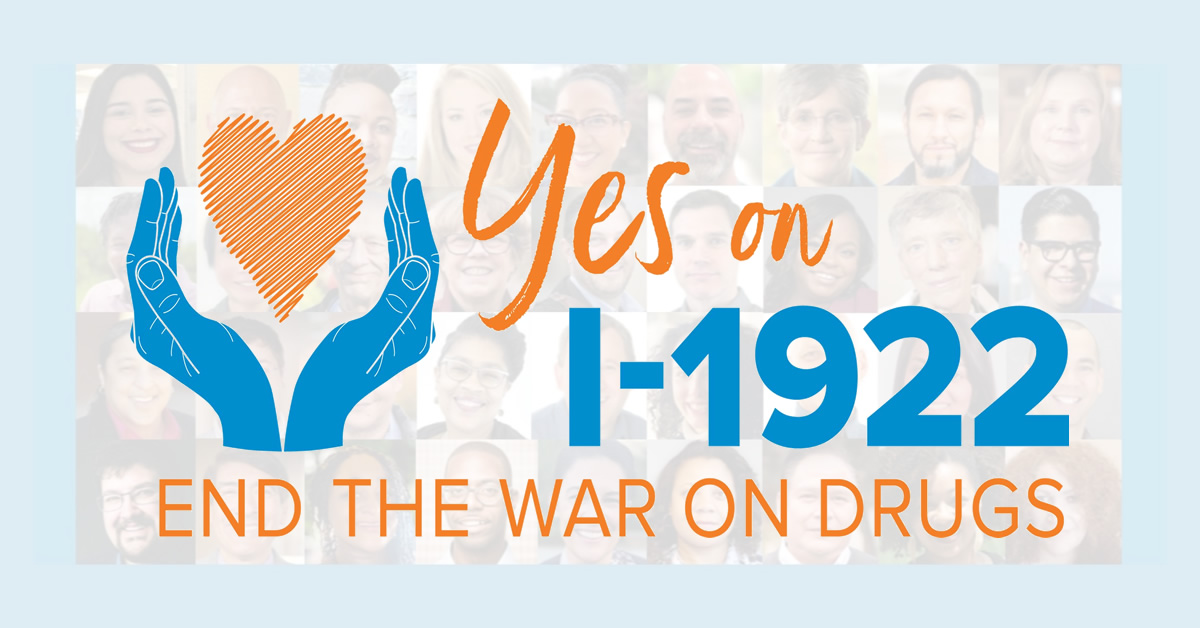An ambitious statewide initiative that sought to decriminalize drug possession in Washington State and replace failing drug laws with a public health approach won’t be on the November 2022 ballot, organizers announced this week.
Commit to Change Washington, which is backed by a coalition led and financially supported by the American Civil Liberties Union (ACLU), said in an email on Monday and in a subsequent article republished yesterday that they have made “the difficult decision to cease signature gathering efforts this weekend.”
“We will not be moving forward to qualify Washington State Initiative Measure No. 1922 to the November 8th general election ballot,” the campaign said. “Signature gathering proved more challenging and prohibitively expensive than projected.”
I‑1922 faced a deadline of 5 PM on July 8th to turn in about 405,000 signatures. The minimum number of valid signatures is 324,516 and a cushion of about 25% is recommended to offset duplicate and invalid signatures. Measures submitted with a signature cushion are usually validated with a random sample check by temporary elections staff hired by the Office of the Secretary of State.
According to reports filed with the PDC, the effort to qualify I‑1922 had raised $3,509,246.62, with $2,685,185.56 spent and outstanding debt of $669,413.21.
Commit to Change Washington’s announcement did not say how many signatures had been gathered since its drive began earlier this year.
I‑1922 is the second initiative effort to founder before this year’s signature deadline. A few weeks ago, an effort to repeal the state’s capital gains tax collapsed, though unlike I‑1922, that campaign didn’t gather a single signature.
“This is especially hard news for us, because we were going to win,” Commit to Change Washington’s email to supporters declared.
“A recent poll by Data for Progress found that Washington voters supported I‑1922 by a very wide margin – upon reading the ballot language, 67% said they’d vote for the measure and only 22% against it, with 11% undecided.”
That poll, conducted from June 3rd to 9th, was released by Data For Progress on the same day that Commit to Change Washington announced the demise of I‑1922. The sample consisted of 462 respondents, all of whom participated online. The respondents were asked the following question:
Some groups in Washington are proposing a ballot measure that reads as follows:
This measure concerns drug use, treatment and penalties, and related funding. This measure would fund substance use disorder prevention, outreach, recovery, training, study and public education; decriminalize drug possession but allow seizure and forfeiture; authorize vacation of certain drug-related convictions; and amend related laws.
If the election were held today, would you vote for this measure or against this measure?
The 67% support Data For Progress found is far higher than what Fairbank, Maslin, Maullin, Metz & Associates (FM3) found when the firm tested the I‑1922 ballot title in March of 2022. In FM3’s poll, 53% indicated support (26% definitely, 20% somewhat, 6% undecided but lean yes), while 39% indicated opposition (26% definitely, 11% probably, 2% undecided but lean no.)
You can see the finding here in this slide deck provided by the campaign.
Our team at NPI also recently tested the I‑1922 ballot title (NPI’s board took a position supporting I‑1922 last month), and the results we got were pretty similar to the results that FM3 got. We found 52% total support and 33% total opposition. That indicates that the actual level of support is about what FM3 originally found, rather than the much higher 67% found by Data For Progress.
Here’s the exact text of the question we asked, and the responses we received:
QUESTION: This November, there may be an initiative on the statewide ballot concerning drug use treatment and penalties and related funding. The official description is as follows: This measure would fund substance use disorder prevention, outreach, recovery, training, study, and public education; decriminalize drug possession but allow seizure and forfeiture; authorize vacation of certain drug-related convictions; and amend related laws. If the election were being held today, would you definitely vote yes in favor, probably vote yes in favor, probably vote no against, or definitely vote no against this initiative?
ANSWERS:
- Yes: 52%
- Would definitely vote yes: 29%
- Would probably vote yes: 23%
- No: 33%
- Would probably vote no: 13%
- Would definitely vote no: 20%
- Not sure: 14%
Our survey of 1,039 likely 2022 Washington State voters was in the field from Wednesday, June 1st through Thursday, June 2nd, 2022.
It utilizes a blended methodology, with automated phone calls to landlines (50%) and text message answers from cell phone only respondents (50%).
The poll was conducted by Public Policy Polling for the Northwest Progressive Institute and has a margin of error of +/- 3.0% at the 95% confidence interval.
More information about the survey’s methodology is available here.
Since I‑1922 won’t appear on the ballot, we will never know how it would have fared with voters had it qualified. Although the ballot title did not perform as well in our testing this month and in FM3’s earlier research as it did in Data For Progress’ poll, all three surveys did find majority support for the measure.
That is strong evidence that most Washingtonians do favor a shift from “criminalizing people who use drugs and focus instead on public health strategies we know are more effective at addressing the root causes of substance use disorder,” as Commit to Change Washington’s campaign update put it.
The coalition now plans to refocus its efforts on the legislative process.
“We know our work must continue; Washington State’s current drug possession penalties are set to expire July 1st, 2023, and we expect the legislature to take up the matter in the 2023 session that begins January 9th,” the campaign said.
We thank Commit to Change Washington for their work on I‑1922 and will be supporting the efforts to prepare for next year’s legislative session.

